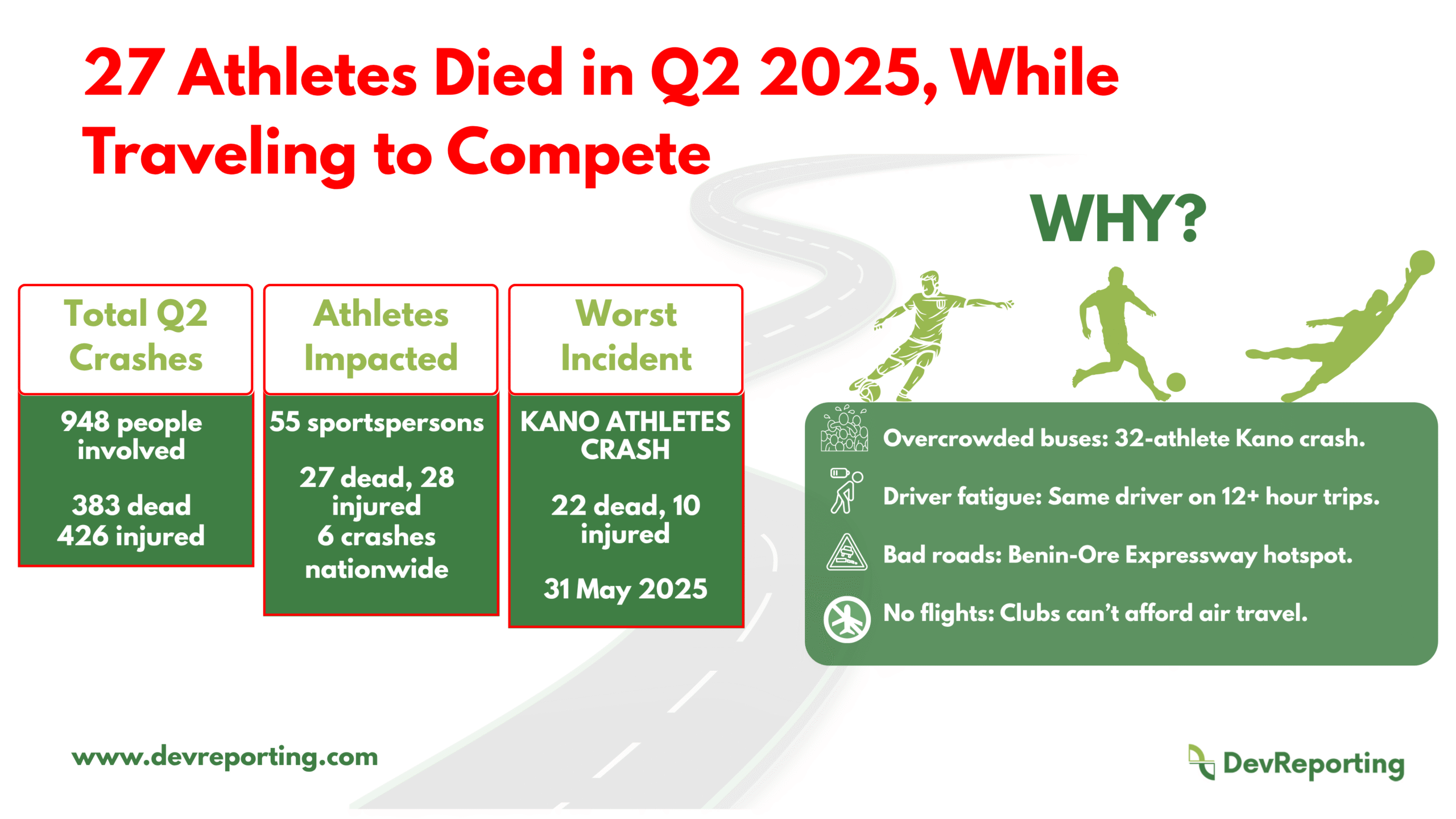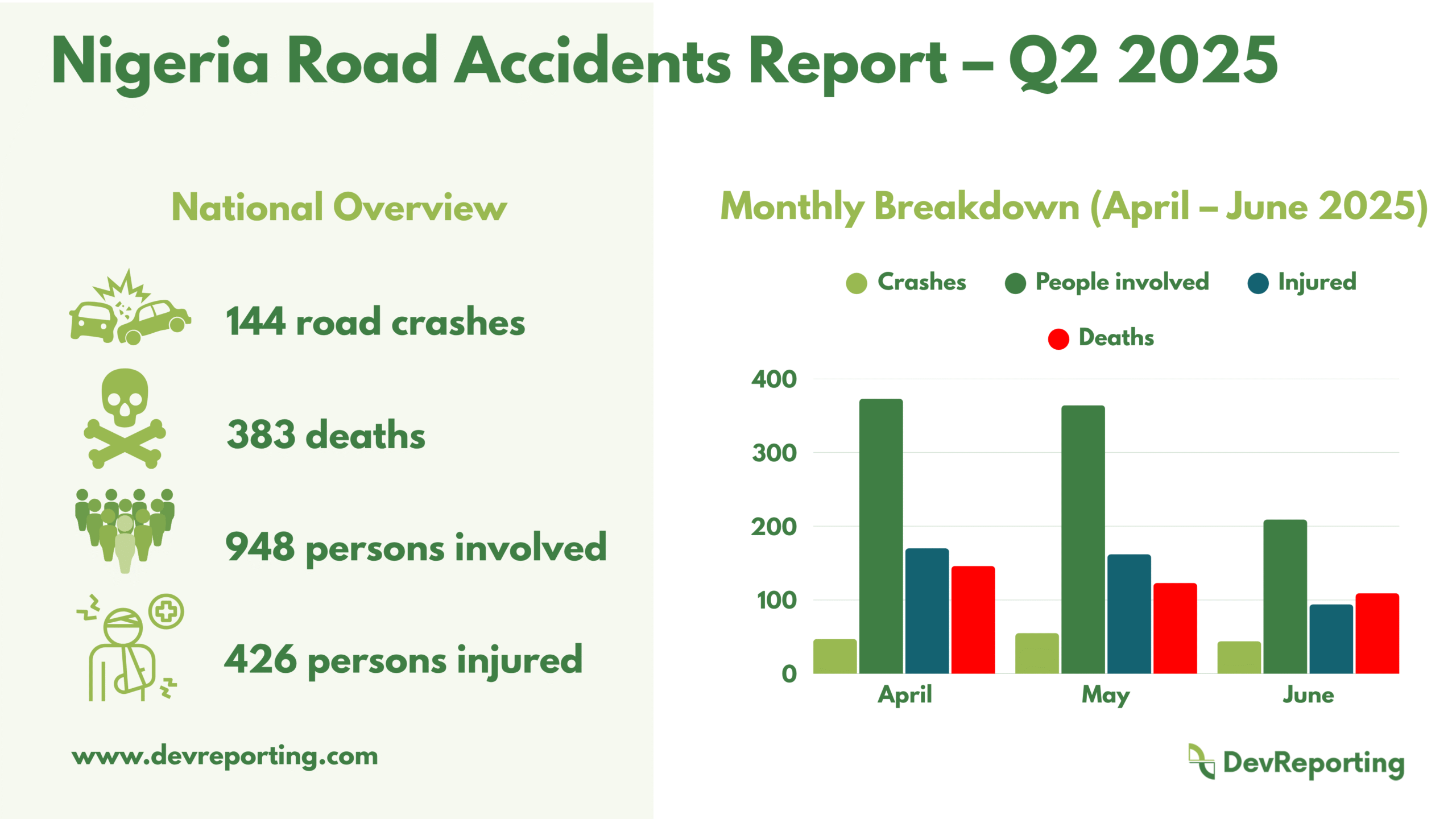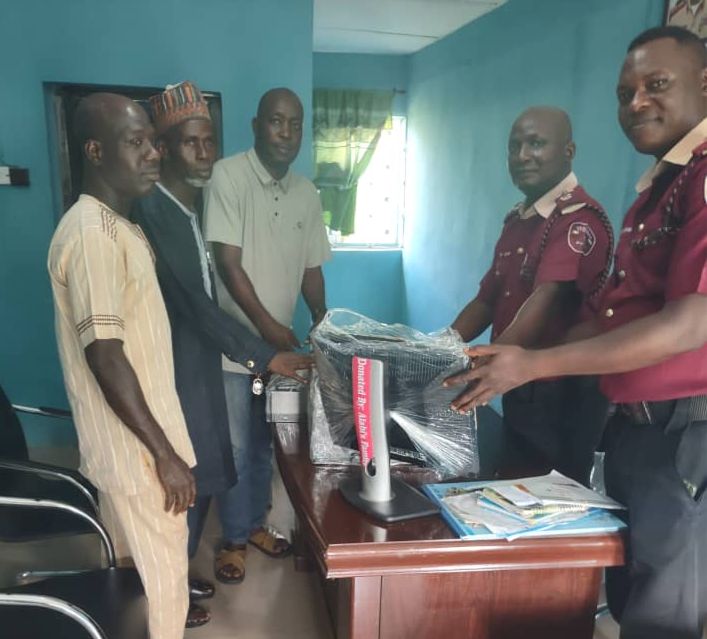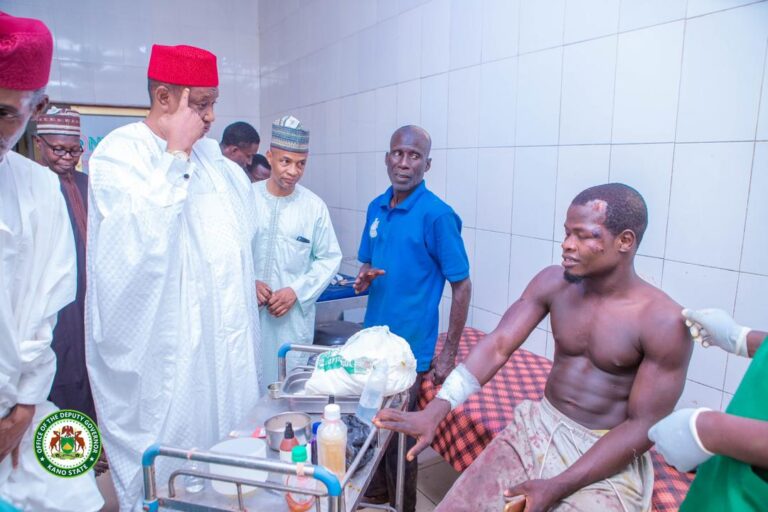As Nigerians continue to savour the glory of Super Falcon’s victory at WAFCON and the latest success of D’Tigress at AfroBasket 2025 on Sunday, a review of the road crashes recorded nationwide between April and June 2025 by DevStats has shown that many sportspersons died while on their own journey to stardom.
DevStats, a DevReporting project that focuses on collecting, analysing, and disseminating data on key developmental issues in Nigeria, observed that within the second quarter of 2025, spanning April to June, no fewer than 383 people died in road crashes involving 948 persons, while 426 people sustained varying degrees of injuries.
Of these figures, from Sokoto to Plateau, Lagos to Kano, and Benin-Ore Expressway in Edo and Ondo states, six crashes involving 55 sportspersons were recorded, leaving 27 dead and 28 injured.

From Yobe Desert Stars players to contingents from Kano and Lagos states at the national sports festival in Ogun State, and a lone sports cyclist on a Lagos road, the stories of these sportspersons call for urgent action.
Meanwhile, fuel-laden tankers and trucks in cargo businesses were also involved in major crashes that left many dead and hundreds injured.
Despite a series of requests and a letter sent to the Federal Road Safety Corps (FRSC) under the Freedom of Information Act (FoI), the agency failed to make available details of crashes recorded on Nigerian roads; hence, the statistics may not capture the entire road crashes recorded in the country within the period under review.
Our reporter monitored and documented the pattern of occurrences, causes, vehicles involved, and locations from various Nigerian media reports between 1 April and 30 June, highlighting the urgent need for improved safety measures to mitigate this growing public concern.
Recently, an ex-Nigerian international, Brown Ideye, who plays for Enyinba Football Club of Aba, Abia State, publicly expressed frustration playing in the country’s national league. He complained about backlogs of unpaid salaries and allowances despite “travelling from Aba to Kano by road and playing a game the next day.”
The Chairman of the Nigeria National League Club Owners and Managers Association (NALCOMA), Godwin Enakhena, and the Vice President of the Guild of Sports Editors in the country, Adekunle Salami, also spoke on the consequences of the unsafe state of Nigerian roads for sports lovers.
They suggested ways to overcome the challenges of infrastructural decay, poor funding of teams, and teams’ failure to adhere strictly to road safety rules.
READ ALSO: Yuletide: As Nigerians travel, accident data signals warning for road users
However, the Director of Media at the Nigeria Football Premier League (NPFL), Harry Iwuala, said he would not speak on the matter because NPFL could not have been involved in the crashes during the period under review.
“You may be aware that the NPFL was concluded in May, the second month of Quarter 2,” Mr Iwuala told DevReporting.
In reaction to the fuel tanker crashes, the Chief Executive Officer of OlaTaram Oil and Gas Limited, Titilope Anifowoshe, described the development as “symptomatic of deeper structural issues in the country’s downstream sector.”
Q2 crashes
In April, 47 road crashes were reported involving 101 vehicles, 373 persons, and 146 fatalities. 170 people sustained varying degrees of injuries.

The crash with the highest number of casualties in the month happened in Borno State on 28 April, after an Isuzu Pickup Van reportedly hit an Improvised Explosive Device (IED), claiming 26 lives.
In May, 55 road crashes that involved 364 people left 123 dead, and 162 injured. A total of 114 vehicles were involved. The accident with the highest number of casualties in the month occurred on 31 May, involving 32 persons who were members of the Kano contingency athletes in the National Sports Festival, held in Abeokuta, Ogun State.
According to FRSC, 22 athletes lost their lives in the auto crash, while 10 sustained serious injuries. This figure was closely followed by a crash in Kogi State on 26 May, where 19 people lost their lives and eight others sustained injuries.
Meanwhile, June had the lowest number of crashes at 44, involving 209 persons, 106 deaths, with 94 sustaining injuries.
Within the three months under review, the crashes across the country involved a total of 295 vehicles, including cars, commercial buses, trucks, trailers, motorcycles, and tricycles.
Breakdown per state
DevStats analysis shows that the media reported at least one auto crash in 32 states of the federation within the second quarter. Lagos, with 34 of the total 146 reported cases, topped the chart, followed by Ogun, Oyo, and Abuja, Nigeria’s Federal Capital Territory (FCT), with 17, 16, and eight cases, respectively.
Other states featured on the list included Ondo and Kaduna, with five cases each. Rivers, Osun, Abia, and Bauchi followed with four cases each, while Gombe, Enugu, Jigawa, Ebonyi, Kano, Kwara, and Anambra recorded three cases each.

While Benue, Yobe, Kogi, Borno, Edo, Niger, and Akwa-Ibom recorded at least two cases in the second quarter, Sokoto, Plateau, Cross River, Delta, Imo, Taraba, and Benue recorded a case each.
Fatalities
According to the data, Lagos, with 60 deaths, recorded the highest number of fatalities, while Kano State followed with 42 fatalities in three reported crashes.
In Ogun, 40 fatalities were recorded from 34 reported cases, while Borno, Kogi, and Oyo recorded 30, 25, and 22, respectively. Gombe had 17, Kaduna recorded 13, and Akwa-Ibom had 13 fatalities in the second quarter.
Weekly timeline of crashes
Week 1: No fewer than 60 lives were lost 14 auto crashes involving 180 persons in the first week (Tuesday 1-Monday 7) of April. Within the period, eight police officers were reportedly injured in a crash along Aba-Owerri road, and five persons died in accidents in Gombe and Osun on 2 April.
Also, Yobe Desert Stars players, alongside three officials sustained injuries in a road crash in Sokoto while travelling for a league match in Birnin Kebbi. On the same day, 15 people died in Kano State while 10 others sustained injuries when a bus conveying 25 people crashed into a parked trailer. 18 people died during a rescue operation of road accident victims in Ogun.
In Abuja, a truck also lost its brakes and rammed into five tricycles, killing two people, and the notorious Otedola bridge in Lagos also came in the picture, among other cases.
Week 2: At least 35 people were involved in seven reported cases that claimed six lives between 8 and 14 April. Lagos recorded a death on 12 April. On 13 April, one person died from a fatal collision involving two trucks in Bauchi. Also, a hit-and-run accident claimed the life of a Jigawa council chairman on 13 April.
In Ebonyi State, a commercial bus conveying 25 passengers lost control and somersaulted three times, leading to the death of a baby girl and a woman.
Week 3: Between 15 and 21 April, 11 cases of road accidents were reported, involving 57 people and 21 deaths. The week started with a near-death report in Kwara State when a 45,000-litre petrol tanker rammed into a parked container truck.
While one died in a lone crash in Akure, Ondo State capital, two petrol tankers caught fire along the Ife/Ibadan expressway in Oyo. A seven-year-old girl was also killed by a hit-and-run driver in Ondo State and a Dangote truck killed one and left three others injured in a crash in Abuja.
Also, seven people died in Ogun and Ondo on Easter Saturday while a group of worshippers were involved in an accident on Easter Monday in Gombe State. There were other cases during the week, including the multiple road accidents in Okene Local Government Area of Kogi State.
Week 4: Road crashes in the fourth week, between 22 and 28 April, involved 79 people and claimed 46 lives. On Friday, 25 April, four people died in a road crash that involved 17 people, while 13 others sustained injuries in a bus conveying some footballers in Plateau State. And in another tragic accident, two UTME candidates died and six others were injured along Ogbomoso Road on 25 April. The next day, a truck veered off a bridge on the old Lagos-Abeokuta Road in Lagos, crushing two commercial buses while the driver suffered severe injury. While a cyclist died after colliding with a heavily loaded truck in Lagos on 27 April, a national security threat occurred in the Kala-Balge in Gamboru-Ngala Local Government Area of Borno State, when a truck reportedly hit an Improvised Explosive Device (IED) on the road, leading to the death of 26 people. In Anambra, on 28 April, an accident involving a petrol tanker, claimed eight lives.
Week 5: On Tuesday, 29 April, two vigilante members were killed by a hit-and-run trailer. Another trailer killed five and left seven others injured in an accident at Park C, Mowe, along Lagos-Ibadan road.
As April wrapped up, on Wednesday, 30, five individuals were injured in an auto crash in Lagos and four lives lost in a crash in Kaduna.
READ ALSO: From celebration to mourning: Fatal road accident kills at least 19 Kano athletes
Similarly, the first weekend in May was marred by 12 deaths and six injuries in two different road crashes in Cross River and Kano states while two siblings died in a road crash in Benue State. On 5 May, an accident in Ute community of Ondo State claimed a mother and child.
Week 6: Between 6 and 12 May, 12 road crashes were reported, involving 48 people leading to 17 deaths. Four different road crashes were reported in Lagos (2) and Ogun (2) on Wednesday, 7 May.
Others were recorded on the Lekki-Epe expressway in Lagos and a tragic crash claimed two dispatch riders’ lives in the same state.
Also, a man dressed as a masquerade was crushed to death by a tricycle in Anambra while four pedestrians died after a car lost control in Rivers State. In another auto crash in the state, six people lost their lives.
In Abuja, a fire service rescue truck killed three teenagers and left one injured.

Week 7: Between 13 and 19 May nine cases were recorded with 104 people involved leading to 11 deaths, while 43 people sustained injuries.
A truck carrying federal government grain and 36 passengers crashed on Sunday, 18 May, killing seven, while 35 people sustained varying degrees of injuries in another accident in Abuja.
Other crashes within the week included the Team Lagos crash on their way to the 22nd National Sports Festival in Ogun State; a lone crash of a 45,000 litre capacity kerosene tanker in Ogbomoso, Oyo State, while two died in Ogun State when a car rammed into motorcycle riders.
Week 8: Between 20 May and 26 May, 81 persons were involved in 13 reported cases of road crashes, predominantly in Kogi, Lagos, Benue, and Abuja.
Week 9: At least 54 persons died in 13 reported cases involving 102 persons during the period. Most fatalities were recorded on Saturday, 31 May, when 22 of 32 Kano athletes died in a fatal crash along the Kano-Kaduna highway.
Also, six different road crashes were reported in Ogun, Osun, Ondo, Akwa Ibom, FCT, and Delta State on 28 May, accounting for 22 deaths in a single day.
Week 10: Between 3 and 9 June, seven road crash reports were recorded, involving 55 people and 32 deaths. Multiple crashes in Jigawa, Lagos, and Kaduna had the highest casualties in the week, with 26 fatalities.
An auto crash in Jigawa on 7 June claimed nine lives. In Lagos, nine others also lost their lives in a crash that involved 14 people, while in Kaduna, eight people were reported dead on 8 June.
Week 11: There were 14 reported cases between 10 and 16 June involving 42 people and 25 deaths, while 13 sustained injuries.
In a Lagos crash on 11 June, five lives and left seven others injured while five individuals, identified as hoodlums, died in a truck crash in Oyo State.
Week 12: At least 30 people were involved in nine reported cases from 17 to 23 June. While 12 people were reported dead, 11 others sustained injuries. A tragic auto crash in Imo State on 23 June resulted in the death of 9 individuals. An eyewitness account told newsmen that the crash was caused by overspeeding in bad weather.
Week 13: 82 individuals were involved in 10 reported road crashes between 24 and 30 June. Also, 36 deaths were reported, as 41 people reportedly sustained injuries.

Two separate road crashes on 24 and 25 June on the Lagos-Ibadan expressway and Gombe claimed 10 and 8 lives, respectively. The first fatal crash was on Tuesday in Ibadan, Oyo state. The next day, Gombe State mourned the loss of eight people, including a police officer.
Stakeholders speak
Speaking on the development, the Vice President of the Guild of Sports Editors, Mr Salami, told DevReporting that the road crashes involving sportspersons are quite more than what is reported, saying most are covered up to avoid public opprobrium.
On the incident involving Kano athletes, Mr Salami disclosed details of investigations into the circumstances surrounding the crash.

“There were other accidents involving professional teams in the country. In fact, we recorded three after the Kano case but there was no noise because no life was lost but people were injured. When we investigated the Kano situation, we discovered that the same driver that took the vehicle from Abeokuta was the same driver that took it to the point of that accident.
In other parts of the world, drivers must not drive a vehicle for a maximum of four hours. After four hours, you will be asked to take a break, rest for about one hour, stretch yourself and all that. You refresh, then you move on. In fact, in most cases, what they do is that when you get to a point, the driver has to be changed. But in Nigeria, it’s just one driver that will take a vehicle from Lagos to Maiduguri and back. It’s not as easy as that and that is actually one of the main causes of accidents on our roads.”
Mr Salami suggested that the teams could either approach airlines for discounted flight tickets for the athletes, and that the vehicles should be in good condition. He also suggested that the leagues could be organised in a format that accommodates separate arrangements for southern and norther Nigerian teams, with the best teams in the two regions scheduled to meet for the finals.
On his part, the NALCOMA chairman, Mr Enakhena, said his association is helpless in addressing the crisis, noting that good roads would minimise accidents on Nigerian roads, even as he noted that the carnage is not restricted to the sports industry.

“A few clubs have entered into partnerships with airlines, but this is in the Nigeria Premier Football League (NPFL). If the NPFL is still battling to attract the support of airlines, the Nigeria National League (NNL) has a lot of work to do to attract the support of airlines. This is not to say that there are not clubs in the NNL who travel to match venues by air, I, however, agree that it can be better,” Mr Enakhena said.
Meanwhile, Mr Enakhena said the NNL regular season is played regionally as part of the measures to address logistic issues.
“The teams in the north are divided into two groups and they play among themselves; the same thing applies to teams in the southern part of Nigeria. It’s only the Super 8, which brings together four teams each from the two conferences that see all eight teams assemble in one venue for about a week to determine teams that will play in the NPFL and to crown the overall winner of the NNL,” he explained.
On trucks
Having identified the frequent tanker crashes on Nigerian roads, the CEO of OlaTaram Oil and Gas Limited, Ms Anifowoshe, decried what she described as “a glaring absence of a standardised, professional training and licensing system for tanker drivers.”
“Most (tanker drivers) learn on the job, akin to apprenticeships in informal sectors like tailoring. That is dangerously inadequate for handling combustible materials and maneuvering 30-ton vehicles across unpredictable Nigerian roads,” she said.

She listed control measures to include fixing of Nigerian roads, mandatory institutionalisation of certified training programmes for tanker drivers, and that “FRSC must go beyond checkpoints and punitive actions, it must actively collaborate with downstream stakeholders to build a database of certified drivers, enforce regular mental and physical fitness tests, and deploy digital monitoring systems (such as GPS trackers) to flag erratic driving behavior in real time.”
She said the sustainable means of transporting fuel would be a perfect rail system and also water transport mode, noting that “the over-reliance on road haulage for fuel distribution is not just unsafe but also economically and environmentally unsustainable.”
“Rail is Nigeria’s most viable and long-term solution. A functional freight rail network dedicated to petroleum products will drastically reduce road crashes, minimise wear and tear on highways, and ensure a safer, greener logistics ecosystem,” she added.
Family supports FRSC
Meanwhile, as part of the efforts towards ensuring FRSC’s efficiency and accountability, the Alabi family of Ilobu, headquarters of Irepodun Local Government Area of Osun State, recently donated a desktop computer and printer to the community’s unit command of FRSC.
Speaking on behalf of the family, the Chairman of the Awoleye Alabi Memorial Foundation (AWAMEF), Mr Hassan Alabi, expressed the family’s support for road safety and community development.

In its appreciation letter to the family, signed by the Chief Route Commander, Temitope Aluko, FRSC, said the command had operated without printing facilities before the donation, saying the family’s “act of generosity reflects a deep sense of community support and commitment to the advancement of road safety in our environment…”
Mr Aluko added that the donated items will go a long way in strengthening the agency’s capacity to serve the public better.
…………………
Read our report of the Q1 incident here.


